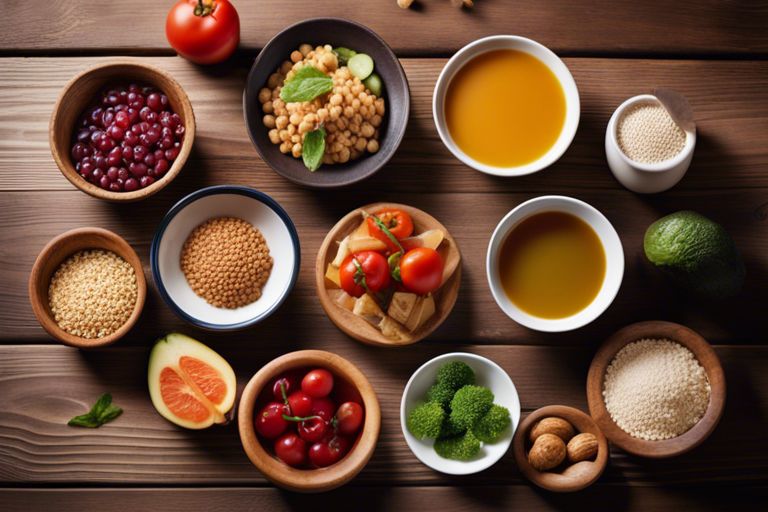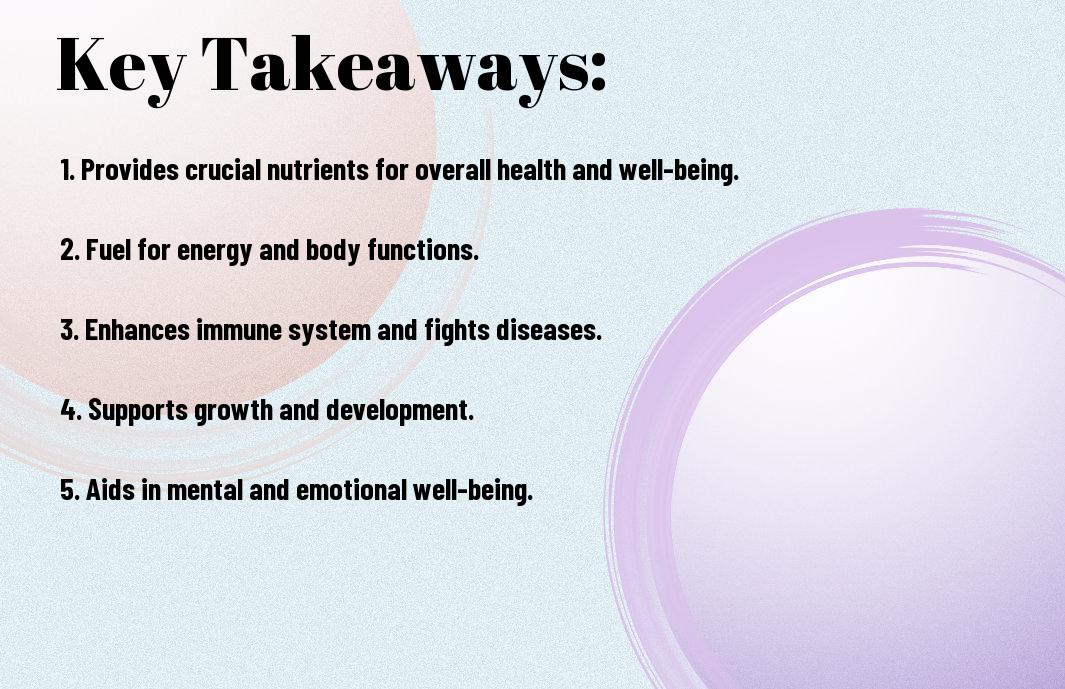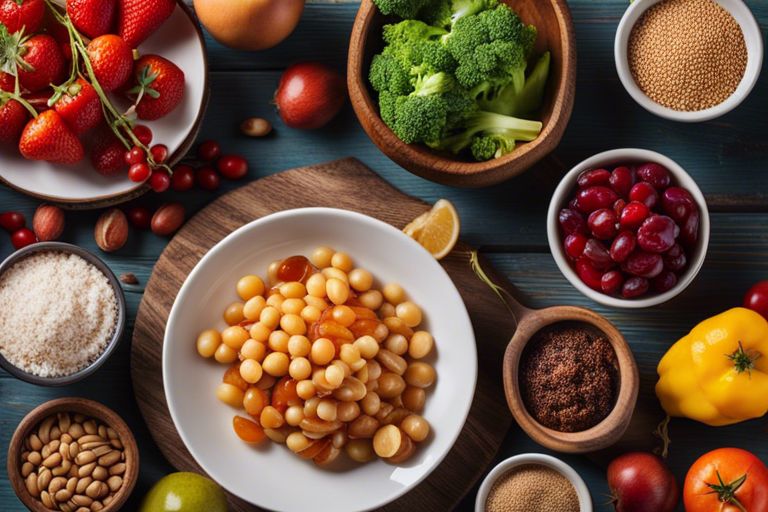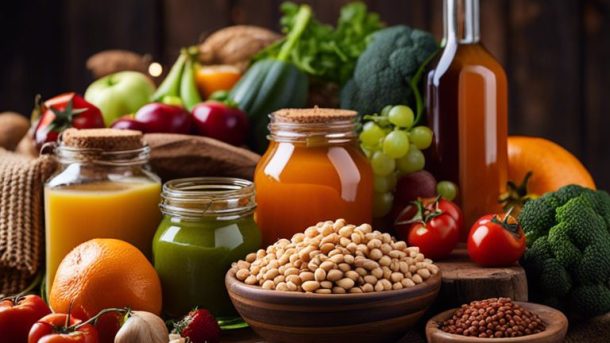Health is a fundamental aspect of your well-being, and the food you consume plays a vital role in maintaining it. In this informative article, we will explore the five key importances of food and how they impact your overall health and quality of life. To investigate deeper into how food can improve your health from body to brain, check out From Body to Brain – 5 Ways Food Improves Your Overall …

Key Takeaways:
- Nutrition: Food provides crucial nutrients that are necessary for growth, energy, and overall health.
- Social Interaction: Food plays a central role in socializing, bringing people together, and creating bonds.
- Cultural Identity: Food is deeply tied to culture and heritage, reflecting traditions, values, and beliefs.
Importance of Food for Energy
While food is necessary for overall health and wellbeing, one of its primary roles is to provide you with the energy needed to function on a day-to-day basis. The foods you consume are broken down into macronutrients, namely carbohydrates, proteins, and fats, which play a crucial role in fueling your body.
The Role of Macronutrients
The carbohydrates you eat are converted into glucose, which is the body’s main source of energy. Proteins help repair and build tissues, while fats provide a concentrated source of energy for your body. Balancing these macronutrients in your diet is necessary to ensure that you have a steady supply of energy throughout the day.
How Food Affects Physical Performance
Performance in physical activities is heavily influenced by the food you eat. The right combination of carbohydrates, proteins, and fats can enhance your endurance, strength, and overall athletic performance. Consuming a well-rounded diet that is rich in nutrients can help you achieve your fitness goals and excel in your chosen physical activities.
Affects your food choices can have a direct impact on how your body performs during exercise. For example, eating a carbohydrate-rich meal before a workout can provide you with the necessary energy to sustain physical activity for longer periods. Likewise, consuming protein-rich foods after exercise can help with muscle recovery and growth, improving your overall physical performance.

Importance of Food for Health
Some of the most critical aspects of food revolve around its impact on your health. What you eat can have a significant influence on your overall well-being, and it is vital to understand the connection between your diet and your health.
The Connection Between Diet and Disease
Between your daily food choices and the development of diseases, there lies a profound connection. Poor dietary habits, such as excessive consumption of processed foods high in sugar, salt, and unhealthy fats, can increase your risk of developing chronic conditions like obesity, diabetes, cardiovascular diseases, and certain types of cancer. On the other hand, a balanced diet rich in fruits, vegetables, whole grains, lean proteins, and healthy fats can help lower your risk of developing these diseases and improve your overall health.
Nutrients and Their Impact on Overall Well-being
Nutrients play a crucial role in maintaining your overall well-being. Each nutrient – from carbohydrates and proteins to vitamins and minerals – has specific functions that contribute to your body’s optimal functioning. For instance, carbohydrates provide energy, proteins help in tissue repair and growth, and vitamins and minerals support various bodily processes. Ensuring that you consume a diverse range of nutrients through a well-balanced diet is vital for maintaining good health and preventing nutrient deficiencies.
Additionally, certain nutrients have been linked to specific health benefits. For example, omega-3 fatty acids, found in fatty fish like salmon and flaxseeds, have anti-inflammatory properties that can reduce the risk of chronic diseases such as heart disease and arthritis. Including these nutrient-rich foods in your diet can have a positive impact on your overall well-being and longevity.
Importance of Food for Brain Function
Unlike other organs in your body, the brain relies solely on glucose as its primary source of energy. This makes the role of food in brain function crucial. The nutrients you consume play a vital role in maintaining optimal cognitive function, focus, and memory.
The Gut-Brain Axis
With an intricate connection between your gut and brain known as the gut-brain axis, the food you eat directly impacts your mental health. Consuming a diet rich in fruits, vegetables, whole grains, and healthy fats can promote a healthy gut microbiome, leading to improved brain function and overall well-being.
How Nutrition Affects Cognitive Function
Axis
The food you consume not only fuels your body but also influences your cognitive abilities. Nutrients like omega-3 fatty acids, antioxidants, vitamins, and minerals are imperative for maintaining brain health and enhancing cognitive function. Including foods like salmon, nuts, seeds, berries, and leafy greens in your diet can help support your brain health and potentially lower the risk of cognitive decline as you age.
Importance of Food for Social Bonding
Once again, food plays a crucial role in bringing people together and strengthening social bonds. The act of sharing a meal with others goes beyond just nourishment; it fosters connections and builds relationships that are crucial for your well-being.
The Cultural Significance of Food
On a cultural level, food holds tremendous significance. Different cultures have unique culinary traditions that are passed down from generation to generation. These traditions not only preserve cultural heritage but also serve as a way to celebrate and honor shared values and beliefs.
How Meals Bring People Together
Importance of coming together and sharing a meal cannot be overstated. Whether it’s a family dinner, a gathering of friends, or a community feast, sharing food creates a sense of unity and connection among individuals. It allows you to bond with others, have meaningful conversations, and create lasting memories.
Significance of dining together goes beyond just the food on the table; it strengthens relationships, fosters communication, and promotes a sense of belonging. So next time you sit down for a meal with others, remember that you’re not just nourishing your body but also nourishing your social connections.

Importance of Food for Economic Growth
The Impact of Agriculture on Local Economies
Keep in mind that agriculture plays a significant role in the economic development of regions. An increase in food production leads to higher agricultural output, which in turn boosts the local economy. The surplus generated from agricultural activities can be sold in the market, creating income for farmers and stimulating economic growth in the area.
How Food Production Affects Global Trade
Affects on a larger scale, food production has a direct impact on global trade. The ability of a country to produce enough food not only ensures food security for its citizens but also allows for surplus production that can be exported to other countries. This trade in food products contributes to the overall economy of nations and fosters international cooperation and development.
It is important to recognize the interconnectedness of food production and global trade. When countries specialize in producing specific food items efficiently, they can trade with other countries for goods they cannot produce as effectively. This exchange not only promotes economic growth but also creates a network of mutually beneficial relationships among nations.
Importance of Food for Environmental Sustainability
After recognizing the importance of food in our daily lives, it’s crucial to understand how the environmental impact of food production plays a significant role in sustainability efforts.
The Environmental Impact of Food Production
Any food that lands on your plate has a story behind it, including its journey from the farm to your table. The environmental impact of food production encompasses factors such as water usage, greenhouse gas emissions, deforestation, and biodiversity loss. Livestock farming, for example, is a major contributor to greenhouse gas emissions, while crop production can lead to deforestation and habitat destruction.
Sustainable Agriculture Practices
On the other hand, sustainable agriculture practices aim to minimize the negative impact of food production on the environment. Techniques such as crop rotation, organic farming, and agroforestry promote soil health, reduce water usage, and minimize the need for harmful pesticides and fertilizers. By implementing sustainable agriculture practices, we can ensure the longevity of our food systems while preserving the environment for future generations.
Environmental sustainability in food production is vital for maintaining a healthy planet. By adopting sustainable agriculture practices, we can reduce the carbon footprint of food production, conserve natural resources, and protect biodiversity. It’s necessary to support and promote practices that prioritize the health of the planet while meeting the growing demands for food worldwide.
Final Words
As a reminder, food plays a crucial role in maintaining your overall health and well-being. By providing necessary nutrients, promoting good digestion, boosting your energy levels, strengthening your immune system, and improving your mood, food impacts every aspect of your life. It is important to pay attention to your diet and make healthy choices to ensure your body is functioning at its best.
FAQ
Q: What is the importance of food for our bodies?
A: Food provides necessary nutrients that our bodies need to function properly, such as carbohydrates, proteins, fats, vitamins, and minerals. These nutrients play a key role in maintaining our overall health and well-being.
Q: How does food impact our energy levels?
A: Food is the primary source of energy for our bodies. The carbohydrates in food are converted into glucose, which is used by our cells as fuel. Eating a balanced diet ensures that we have sustained energy levels throughout the day.
Q: What role does food play in maintaining a healthy immune system?
A: Certain nutrients found in food, such as vitamin C, vitamin E, and zinc, help support a healthy immune system. Consuming a variety of fruits, vegetables, and whole grains can boost our immune function and help us fight off illnesses and infections.


